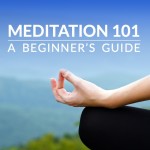Bulletproof Meditation Tips
Meditation is all about finding a source of awareness and peace within. If you’ve tried meditation before, I’m sure you’ve experienced this for yourself. When we meditate, worries, to-do lists, and the relentless push of time all fade into the background. What emerges is a calm and quiet sense of positivity and clarity.
I love that feeling of peace and elevation, and the new perspectives and realizations I gain through regular meditation practice. But in my busy schedule, I find it hard sometimes to keep up a daily practice. Even when there is a break in the schedule, sometimes it’s just laziness that keeps me from meditating.
The Power of Renunciation
For this reason, I think we all need meditation tips to fuel our practice. Whether your schedule is busy like mine, or you’re feeling lazy, restless, and distracted, here’s one easy trick that I practice, and it’s a great way to work meditation into your schedule every day.
Make this commitment to yourself—don’t eat until you meditate!
This is called renunciation, and it’s a time-honored spiritual practice. For some people, positive reinforcement helps to create new habits and for others, negative reinforcement—also know as renunciation—can be a powerful means to achieving your spiritual goals.
It’s not as harsh as it sounds, I promise. Most of us eat 3-5 times a day. The agreement you’ve made with yourself is pretty simple—just don’t put anything in your mouth before taking a moment to meditate. Depending on how hungry you feel, you can try a long meditation or perform a short blessing before you eat. Both of these approaches work and help build your practice.
Every time to do this short meditation, you’re feeding your spirit before your body. You’re also creating momentum. Try this, and before you know it, you will have developed a valuable new habit that strengthens your daily meditation. That’s the goal of this exercise.
I know this can sound like a forced approach to meditation. But if you’ve already fallen in love with meditation and experienced its benefits, you already have an advantage. Sometimes we just need a little bit of discipline (and renunciation) to make meditation a solid, daily habit.
What do you think? Is this exercise something you want to try? Give it a try and let us know what happens. What are your meditation tips for fitting practice time into a busy schedule? Share in the comments below!




I am disciple of Osho Siddarth and Osho Shilaendra of Oshodhara (Oshodhara.org). There are 21 groups of meditation in Oshodhara. I have completed 9th group (level) and have introduced meditation among Nepalese residing in Omaha, Nebraska and Denver, Colorado. I live in Omaha presently. Osho Siddrtha and Osho Shailenra are planning to come to the US in next Summer.
I am impressed by your article and the knowledge you have on Esastern philosophy.
NAMASTE BHAKTI :THANKS FOR YOUR KIND TIPS ON MEDITATION . I HAVE MADE A SIMIAR VOW. IN FACT MEDITATION AS YOU KNOW BETTER IS MORE EFFECTIVE ON AN EMPTY STOMCH.THAT IS HOW THE RELIGIOUS PRACTICE OF FASTING HAS COME IN TO VOGUE. MAY THE UNIVERSAL CONCIOUSNESS BLESS US AL IN OUR SPIRITUA PATH.REGARDS.NAMASTE.
Namaste and thank you for your comments and kind words! And yes, I’ve definitely noticed the benefits of meditating on an empty stomach, too. You feel more alert. Chances are you’ll feel really sleepy if you meditate right after a meal…